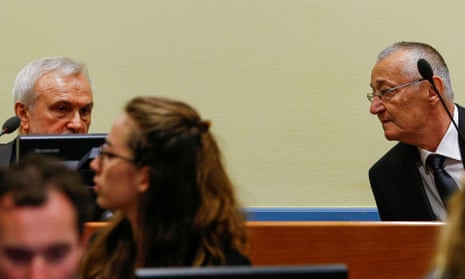The longest running war crimes case will come to a head on Wednesday with a verdict at The Hague tribunal on two former Serbian secret police chiefs for their role in atrocities in Croatia and Bosnia.
It is historic not just because of its length, but also because of what it will say about Belgrade’s covert role in the 1992-95 Bosnian conflict and about the legal accountability of covert state sponsors of paramilitary groups.
“This exhaustively litigated case against two high-level Serbian officials is the litmus test to prove Belgrade’s orchestration of ethnic cleansing in Bosnia and Croatia during the early 1990s. The link to Belgrade’s leadership would be damning,” said David Scheffer, former US envoy on war crimes issues and vice-president of the American Society of International Law.
Jovica Stanišić, the former head of the state security service (DB) and his deputy, Franko “Frenki” Simatović, were first indicted in 2003 for allegedly arming and orchestrating paramilitary groups responsible for war crimes in the Croatian and Bosnian wars. They were once two of the most powerful men in Serbia. Stanišić was also reported to be a CIA informant and the agency took the unusual step of submitting a classified document to the court describing his help.
They were acquitted in 2013, with a majority of the trial judges ruling that the prosecution had not proved “the requisite intent to further the common criminal purpose”. However, a retrial was ordered in 2015 when an appeals chamber ruled that the trial judges had misinterpreted the legal threshold for proving complicity.
In particular it said they had erred by requiring evidence of “specific direction” of crimes as proof of aiding and abetting a broad conspiracy to carry out ethnic cleansing on non-Serbs. That principle of “specific direction” has since been overturned by other judges. The second trial began in June 2017 and Wednesday’s verdict will mark its culmination, after 228 days in court and 80 witnesses.
“The tribunal for the former Yugoslavia has never, in its almost 30-year history, convicted any Serbian official for crimes in Croatia and Bosnia and Herzegovina. Many scholars agree that that does not reflect the reality of the conflict,” Iva Vukušić, a history lecturer at Utrecht University, said.
“It shows just how hard it is to indict, and convict, for crimes committed by allegedly independent actors across a border where no clear chains of command exist.”
Stanišić and Simatović were key members of the regime of Slobodan Milošević, who tried to carve a greater Serbia out of the ruins of Yugoslavia in the 1990s. While Stanišić was in overall charge of the formidable DB secret police, Simatović ran its special operations unit.
Stanišić meanwhile appears to have played a double game. Former CIA officers told the Los Angeles Times in 2009 he had given the agency details of the inner workings of the regime, the location of Nato hostages and mass grave sites.
Vladimir Dzuro, a Czech police officer who questioned both men while serving as an investigator for the international criminal tribunal for the former Yugoslavia (ICTY), said Wednesday’s verdict will be a critical moment in setting the record straight on Belgrade’s hidden hand behind the atrocities in Croatia and Bosnia.
“I believe we established through our investigations that DB, under Jovica and Frenki’s command, organised, supplied, financed and directed various paramilitary units that operated outside Serbia, specifically in the Serb-controlled territories in Croatia and Bosnia,” said Dzuro, who gives an account of his tense encounters with Stanišić and Simatović in his memoir, The Investigator: Demons of the Balkan War.
“Those special units were, for example, Arkan Tigers, Scorpions or Red Berets that became infamous for their brutality, and their crimes were well documented in our indictment.”
The case is the last major Balkan war crimes trial being handled by the international residual mechanism for criminal tribunals, the successor to both the ICTY and an equivalent court dealing with the Rwanda genocide. Ratko Mladić, the former Bosnian Serb military commander, lost his final appeal against his genocide and crimes against humanity convictions earlier this month.
If Stanišić and Simatović are convicted on Wednesday, it is unlikely to change minds in the region, especially among Serbs, who have tended to see war crimes evidence as politically motivated.
“If after all, Stanišić and Simatović would be sentenced for war crimes, it would be understood here as a part of political pressures that intensified lately,” Čedomir Antić, an historian at Belgrade University, who pointed to Stanišić’s reported CIA links. He added: “It could be understood only as an anti-Serb campaign.”
“People have already decided what they believe,” Vukušić said, but added that it would help inform historians of the era if the mass of secret evidence submitted in the two trials was made available.
“This is the longest legal saga in The Hague, to my knowledge at any court. It was also conducted, to a large extent, behind closed doors, presumably Serbia provided documents but on the condition they are not made public,” she said. “Now the question remains will these records ever be public?”
